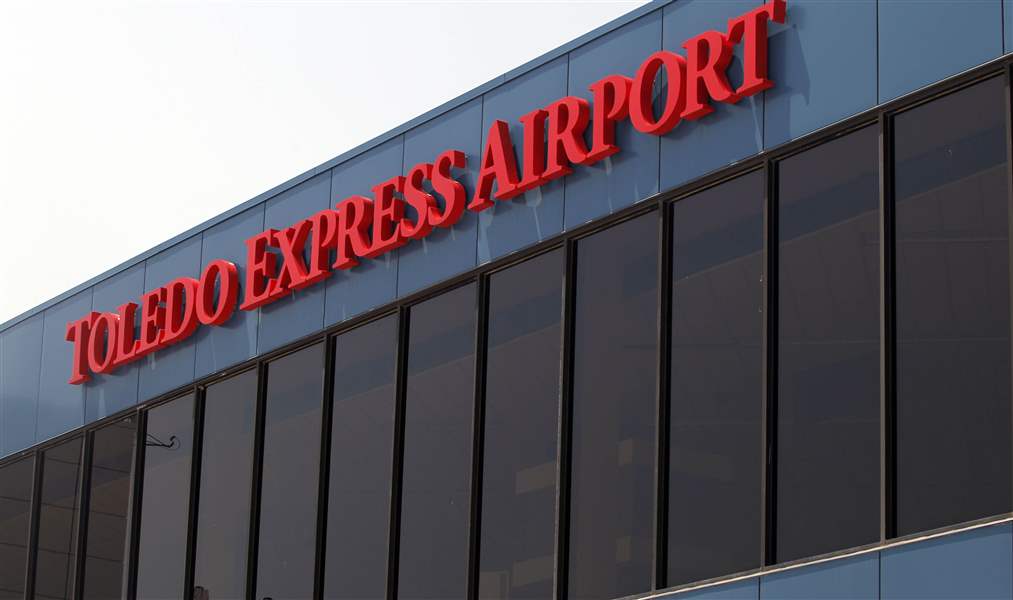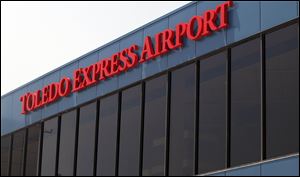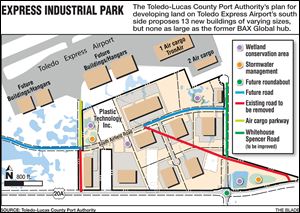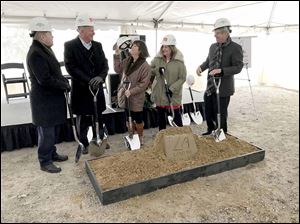
Toledo leaders look to Detroit 'Aerotropolis' as airport development model
3/3/2018
With uncongested airspace and the turnpike and a major railroad line to the north, Toledo Express Airport retains its potential as a development driver, according to a developer.
The Blade
Buy This Image
When BX Solutions lost a freight-handling contract with Amazon.com and ended operations at the former BAX Global air-cargo hub at Toledo Express Airport, the Toledo-Lucas County Port Authority tried offering the facility directly to Amazon for its use as a regional logistics center.
The offering price when the deal was posed 2½ years ago? One dollar.
The response? No deal.
So say both the port authority and Brian McMahon, a local real-estate developer who was present for the talks.
“All the air-cargo companies we talked to said the building was not right for them,” said Joe Cappel, the port authority’s vice president for development.
Amazon wanted a million-square-foot building, Mr. McMahon agreed last week, so the former BAX facility never had a chance.

With uncongested airspace and the turnpike and a major railroad line to the north, Toledo Express Airport retains its potential as a development driver, according to a developer.
But he asserted that, had the port authority and other local leaders been on the ball at the time, they could have found another home somewhere nearby for Amazon. Instead they watched from afar as it established “fulfillment centers” near Detroit and Columbus and a hub for its growing flight operations at Cincinnati/Northern Kentucky International Airport.
And with its uncongested airspace and with the Ohio Turnpike and a major railroad line just to its north, Toledo Express retains its potential as a development driver, Mr. McMahon said.
“We seem to always be following the leaders,” he said last week. “...We have all the assets Rickenbacker [Airport, near Columbus] has, and we’re not using them. We need more regional cooperation — our leadership needs to really get together.”
The advent of new leadership at both the city of Toledo under Mayor Wade Kapszukiewicz and at the port authority, whose board of directors last month elected John Szuch as its new chairman, presents a chance for a fresh look at regional cooperation, Mr. McMahon said.
Land-Air LLC, of which Mr. McMahon is a partner, placed its own bet on the airport’s future in late December when it broke ground on a 100,000-square-foot speculative building it hopes will catalyze development of a 250-acre industrial park just north of Toledo Express.
Mr. McMahon cites as a model for the Toledo airports’ future the airport-oriented development occurring about 50 miles north of Toledo in Michigan between Detroit-Metropolitan Wayne County and Willow Run airports.
Wayne and Washtenaw counties and four local communities near the airports have set up the Detroit Region Aerotropolis Development Corp., which is empowered to grant development incentives as well as to serve as a marketing and consulting agency. Along with Amazon, FiatChrysler Automobiles’ Mopar division, Penske Logistics, and automotive supplier Brose all have recently announced projects there worth more than $300 million combined, according to Site Selection magazine.

Detroit Metro
Detroit Metro, of course, hosts Delta Air Lines’ massive air-passenger hub and lists 12 other passenger carriers offering service, along with significant charter and cargo operations. Willow Run serves cargo, corporate, charter, and general-aviation flights.
Both are managed by the Wayne County Airport Authority, just as both of Toledo’s main airports are under common management by the port authority with the city of Toledo owning them.
Mike Beazley, a senior policy adviser to Mr. Kapszukiewicz as well as neighboring Oregon’s city administrator, sat in when Mr. McMahon gave a recent presentation about the Aerotropolis concept of airport-oriented development to the mayor.
“This administration, and I think administrations across the region, need to be thinking about what are things that can bring in the next generation of jobs,” Mr. Beazley said.
Metro Toledo has the assets — not just its airports, but also major highways, extensive rail service, and its Great Lakes port — that should qualify it for a role, he said, “but how do we capitalize on that, and bring success here?”
Mr. Cappel and Joe Rotterdam, the port authority’s manager of airport operations and airline affairs, said they’re for developing Toledo’s airports to the fullest extent possible, but the challenges involved may not be fully understood. Still, they said, a lot of the work going on is behind the scenes.
They said their agency is setting up Toledo Express, in particular, for future development with its nascent Express Industrial Park on land between the airfield and U.S. 20A south of the airport. The agency is building roads and installing utilities there, while the Ohio Department of Transportation plans to build new roundabout intersection at the site’s two planned entrances.
Express Industrial Park could be viewed as a “mini-Aerotropolis,” but local officials still have to decide how much risk they want to take.

‘Will they come?’
Aerotropolis “sounds sexy,” Mr. Cappel said, “but is it ‘Build it and they will come?’ Or do you let public-private partnerships drive you forward? We have a lot of tools we can work with.”
Mr. Cappel likened the port’s plans for Toledo Express to the first steps it took to redevelop the former Jeep factory site in central Toledo and the ex-Gulf Oil refinery property in East Toledo, now the Overland Industrial Park and Ironville Docks sites, respectively.
The port authority built its own speculative building as well as a road at the Jeep site that led to Dana Corp.’s decision to build an automotive plant there, Mr. Cappel said, while the rail loop and dock improvements at Ironville support Cleveland-Cliffs’ imminent construction of an iron smelter there.
“In each of those cases, we’ve had to set the stage for that,” he said.
The port authority has developable properties at and near the airport listed on its website and on other real-estate oriented websites, Mr. Cappel said. It offers an array of options for building projects ranging from direct construction and ownership — with a lease commitment —to capital leases and financing programs.
“The port authority will go wherever the opportunity is and bring the resources together,” he said.
To fill the former BAX Global space, the port authority last year signed up Tronair, a local manufacturer of ground-service equipment and tools for the aviation industry, to move into the 300,000 square-foot building on the airfield’s south side.
The 10-year lease turned a building port officials said was no longer marketable for cargo handling into a factory employing more than 200 people.
While the port authority would like businesses on the airport to generate air traffic, Mr. Cappel said, “We’re making use of the asset this way.
“What are you going to do, let it sit for 10 years? And they’ve invested in it,” he said, while noting also that Tronair’s jobs pay better than the wages cargo hubs typically offer.

Brian McMahon, left, Brent Gerken, and Lucas County Commissioners Tina Skeldon Wozniak, Carol Contrada, and Pete Gerken broke ground on a 100,000-square-foot spec building near Toledo Express Airport in December.
Businesses at Toledo’s airports, including Grand Aire and Sierra West at Toledo Express and Crow Executive Air at Toledo Executive, have established a solid niche in on-demand cargo and passenger charters, Mr. Rotterdam said.
But getting back into the larger-scale air-cargo game is a difficult proposition, he said, because the major players — and their customers — already have supply chains set up.
“A lot of that logistics is in Detroit. Quite simply, that’s where the market is,” Mr. Rotterdam said.
When DHL introduced a Cincinnati-Toledo-Minneapolis cargo route after BAX Global shut its hub, he recalled, “they were trucking the stuff up to Detroit” and, after seven years, moved their flights there.
Detroit-area freight forwarders also make heavy use, Mr. Rotterdam said, of the cargo bays on the passenger jumbo jets that fly in and out of Metro— a resource Toledo doesn’t have and is unlikely to get.
“The Detroit area is so much bigger,” said Eric Barnum, who, with his father before him, has for decades run Crow Executive Air, an air charter company and fixed-base operator at Toledo Executive. “We don’t even hold a candle to that. It’s the hub of all automotive air freight in the world.”
What Toledo has now, he said, “is a great deal of ad-hoc charter business that the public doesn’t even see ... primarily, it’s running all night long.”
The port authority, he added, recently revamped its Internet marketing presence “and is just now launching some of those vehicles.”
Dan Johnson, the University of Toledo’s president emeritus and a former special adviser on global logistics to the university, agreed that Toledo really isn’t “set up to be another Detroit or Dubai,” but that shouldn’t stop the city from having a significant aviation presence in light of all of its transportation assets.
And for that, he said, some “concentrated thought among our leaders” to come up with a strategic plan is needed.
“It’s a long-term venture, and you’ve got to start now,” he said. “I don’t want to be critical, but there’s a lot more potential than we’re realizing.”
Mr. McMahon offered a similar sentiment, suggesting as an example that Toledo could become a major “spoke” for companies like FedEx that have their hubs elsewhere, and build a niche in corporate-jet travel at Toledo Executive.
“Toledo can be a gateway to world markets that don’t want to deal with Detroit’s congested airspace,” he said.
Contact David Patch at: dpatch@theblade.com or 419-724-6094.